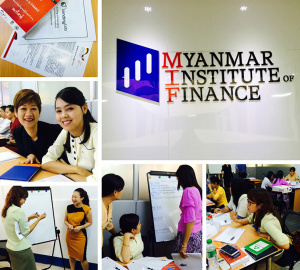The last time I visited Myanmar, crisp dollar bills carefully transported from abroad were king. Foreign debit cards were useless and credit cards were only rarely accepted. Cash was your only option, and changing currencies involved traipsing off to Bogyoke Market (rumored to have the best exchange rates), where you would be presented with large bricks of notes, as no denominations larger than 1,000kyat (roughly USD $1) existed. As a visitor, careful planning was key if the lure of an extra lacquerware pot wasn’t going to land you in a queue of weary backpackers arguing with airport officials, unable to pay their departure tax.
 Until recently, local banks were disconnected from the global banking system, and today, although it’s undergoing rapid change, the financial system is in the rudimentary stage. Earlier this year, BankersLab was appointed by joint partners Gesellschaft für Internationale Zusammenarbeit (GIZ) and Standard Chartered Bank (SCB) to lead an ongoing learning program designed to develop Myanmar’s retail lending industry. [Press Release: BankersLab® launches innovative learning program to develop Myanmar’s retail lending industry]
Until recently, local banks were disconnected from the global banking system, and today, although it’s undergoing rapid change, the financial system is in the rudimentary stage. Earlier this year, BankersLab was appointed by joint partners Gesellschaft für Internationale Zusammenarbeit (GIZ) and Standard Chartered Bank (SCB) to lead an ongoing learning program designed to develop Myanmar’s retail lending industry. [Press Release: BankersLab® launches innovative learning program to develop Myanmar’s retail lending industry]
The challenges were marked. How can we rapidly impart a complex and technical skill set?
Even with the best training in the world, could the local banks win back the trust of consumers who’d suffered from three historical waves of demonetization and the 2003 Myanmar banking crisis?
The learning program is comprised of a series of workshops facilitated over 12 months. Each local bank has appointed two key professionals to attend each of the courses and build up their expertise over time. Our first workshop focused on laying a foundation level understanding of how to build and manage a retail-lending product. Preparations were fraught with considerations – how could we simplify complex concepts so that they are not only easy to grasp, but also, easy to translate? We soon realized that some banking terms don’t have a word in the Burmese language and therefore could not be translated — as Thomas Fuller also discovered. How much information was enough…..or too much? How would participants respond to gamified learning?
A class of curious, energized and engaged participants quickly allayed our concerns. We were constantly impressed by their eagerness to learn, from the most senior participant who diligently went through materials line by line to test their own knowledge, to the youngest participant who despite being unwell, traveled for two hours to the training and insisted on seeing out the course to the end.
…we’d taken a small, but very real step to building a stronger, modernized banking industry that consumers can begin to trust, and will in turn create a stronger nation for the coming generations.
It’s clear that there is a long road ahead, but we left the first course feeling genuinely heartened by what we’d seen and felt that we’d contributed something tangible. The course had not only instilled new knowledge, but also confidence to those that attended. By doing so we’d taken a small, but very real step to building a stronger, modernized banking industry that consumers can begin to trust, and will in turn create a stronger nation for the coming generations.
Stay tuned. How rapidly can the industry come up to speed on modern banking? What challenges lie ahead? We’ll keep you posted on our adventures in Myanmar!


